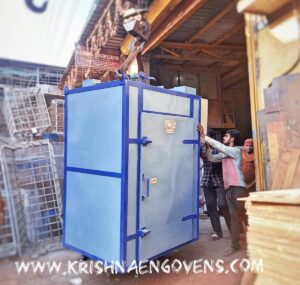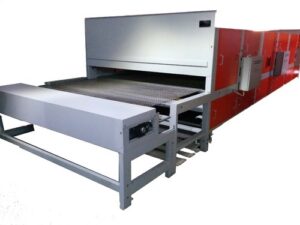What is a Electrode Baking Oven?

An electrode baking oven is a specialized type of oven used in the manufacturing and maintenance of electrodes used in industries such as welding and electrical applications. The oven is designed to heat-treat and dry electrodes to improve their performance and ensure they meet specific quality standards.
Here are some key features and uses of electrode baking ovens:
Features:
Temperature Control: Electrode baking ovens have precise temperature control systems to maintain the desired temperature during the baking process. This ensures consistent and controlled heat treatment of the electrodes.
Ventilation: These ovens often incorporate ventilation systems to remove any fumes or vapors generated during the baking process. Proper ventilation helps create a safe working environment and prevents the accumulation of potentially harmful substances.
Heating Elements: Electrode baking ovens are equipped with heating elements, such as electric coils, that provide the necessary heat for the baking process. The heating elements are designed to distribute heat evenly throughout the oven chamber.
Timer and Controls: These ovens typically feature timers and controls that allow users to set the desired baking time and temperature. The controls ensure accurate and reliable heat treatment for the electrodes.
Insulation: Electrode baking ovens are insulated to minimize heat loss and maintain a stable temperature inside the oven chamber. This improves energy efficiency and ensures consistent heat treatment of the electrodes.
Uses:
Electrode Manufacturing: Electrode baking ovens are used in the manufacturing process of various types of electrodes, including welding electrodes, graphite electrodes, and other specialized electrodes. The baking process helps remove moisture and improve the performance and stability of the electrodes.
Electrode Maintenance: In industries that utilize electrodes, such as welding or electrical applications, electrode baking ovens are used for periodic maintenance. The oven helps dry out electrodes that may have absorbed moisture during storage or use, restoring their performance and preventing defects.
Quality Control: Electrode baking ovens play a role in quality control processes, ensuring that electrodes meet specific performance and quality standards. By subjecting the electrodes to controlled heat treatment, the oven helps ensure consistent and reliable performance of the electrodes in their intended applications.
Electrode Reconditioning: In some cases, electrode baking ovens are used for reconditioning worn or damaged electrodes. The baking process can help remove contaminants or restore the properties of the electrode, extending its usable life and reducing waste.
Electrode baking ovens are essential for the manufacturing, maintenance, and quality control of electrodes used in welding and electrical applications. By providing controlled heat treatment and drying, these ovens help improve the performance, stability, and lifespan of electrodes, ensuring consistent and reliable results in various industrial processes.
Worldwide Exports Location:
Following Countries: Afghanistan, Albania, Algeria, Andorra, Angola, Antigua And Barbuda, Argentina, Armenia, Australia, Austria, Azerbaijan, Bahamas, Bahrain, Bangladesh, Barbados, Belarus, Belgium, Belize, Benin, Bhutan, Bolivia, Bosnia And Herzegovina, Botswana, Brazil, Brunei, Bulgaria, Burkina Faso, Burundi, Cabo Verde, Cambodia, Cameroon, Canada, Central African Republic (CAR), Chad, Chile, Colombia, Comoros, Democratic Republic Of The Congo, Republic Of The Congo, Costa Rica, Cote D’Ivoire, Croatia, Cuba, Cyprus, Czech Republic, Denmark, Djibouti, Dominica, Dominican Republic, Ecuador, Egypt, El Salvador, Equatorial Guinea, Eritrea, Estonia, Ethiopia, Fiji, Finland, France, Gabon, Gambia, Georgia, Germany, Ghana, Greece, Grenada, Guatemala, Guinea, Guinea-Bissau, Guyana, Haiti, Honduras, Hungary, Iceland, India, Indonesia, Iran, Iraq, Ireland, Israel, Italy, Jamaica, Japan, Jordan, Kazakhstan, Kenya, Kiribati, Kosovo, Kuwait, Kyrgyzstan, Laos, Latvia, Lebanon, Lesotho, Liberia, Libya, Liechtenstein, Lithuania, Luxembourg, Macedonia (FYROM), Madagascar, Malawi, Malaysia, Maldives, Mali, Malta, Marshall Islands, Mauritania, Mauritius, Mexico, Micronesia, Moldova, Monaco, Mongolia, Montenegro, Morocco, Mozambique, Myanmar (Burma), Namibia, Nauru, Nepal, Netherlands, New Zealand, Nicaragua, Niger, Nigeria, North Korea, Norway, Oman, Pakistan, Palau, Palestine, Panama, Papua New Guinea, Paraguay, Peru, Philippines, Poland, Portugal, Qatar, Romania, Russia, Rwanda, Saint Kitts And Nevis, Saint Lucia, Saint Vincent And The Grenadines, Samoa, San Marino, Sao Tome And Principe, Saudi Arabia, Senegal, Serbia, Seychelles, Sierra Leone, Singapore, Slovakia, Slovenia, Solomon Islands, Somalia, South Africa, South Korea, South Sudan, Spain, Sri Lanka, Sudan, Suriname, Swaziland, Sweden, Switzerland, Syria, Taiwan, Tajikistan, Tanzania, Thailand, Timor-Leste, Togo, Tonga, Trinidad And Tobago, Tunisia, Turkey, Turkmenistan, Tuvalu, Uganda, Ukraine, United Arab Emirates (UAE), United Kingdom (UK), United States Of America (USA), Uruguay, Uzbekistan, Vanuatu, Vatican City (Holy See), Venezuela, Vietnam, Yemen, Zambia, Zimbabwe.
India Location –
Maharashtra, Mumbai, Pune, Nagpur, Nashik, Virar, Palghar, Aurangabad, Bhiwandi, Thane, Amravati, Malegaon, Kolhapur, Nanded, Sangli ,Jalgaon, Akola, Latur, Ahmadnagar, Dhule, Ichalkaranji, Chandrapur, Parbhani, Jalna, Bhusawal, Navi Mumbai, Raigad, Panvel, Bangalore, Karnataka, Ahmedabad, Gujarat, Chennai, Tamil Nadu, Surat, Coimbatore, Vadodara, Indore, Madhya Pradesh, Bhubaneswar, Orissa, Hyderabad, Andhra Pradesh, Jamshedpur, Jharkhand, Kolkata, West Bengal ,Delhi, Jaipur, Rajasthan, Kochi, Kerala, Chandigarh, Punjab, Dehradun, Uttarakhand , Lucknow, Uttar Pradesh, Visakhapatnam, Andhra Pradesh, Guwahati, Assam, Amritsar, Mangalore, Noida, Gurgaon, Haryana, Bhopal, Madhya Pradesh, Aurangabad, Faridabad, Allahabad, Prayagraj, Jodhpur.




